24 动词语法简介
新概念英语第二册:第24课课文详解及语法解析
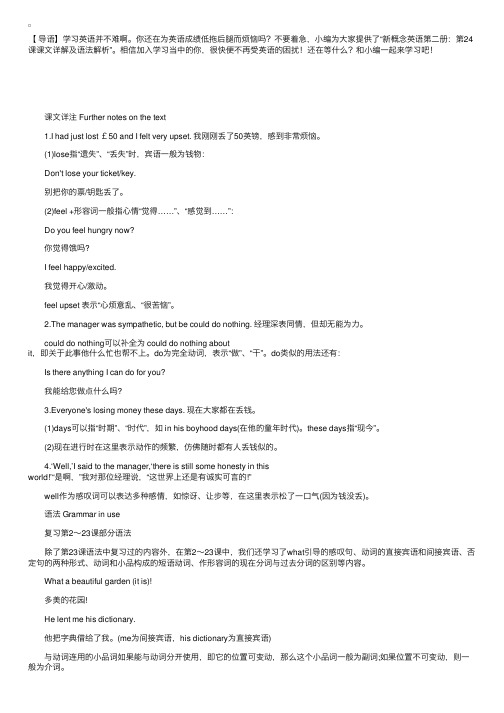
【导语】学习英语并不难啊。
你还在为英语成绩低拖后腿⽽烦恼吗?不要着急,⼩编为⼤家提供了“新概念英语第⼆册:第24课课⽂详解及语法解析”。
相信加⼊学习当中的你,很快便不再受英语的困扰!还在等什么?和⼩编⼀起来学习吧! 课⽂详注 Further notes on the text 1.I had just lost £50 and I felt very upset. 我刚刚丢了50英镑,感到⾮常烦恼。
(1)lose指“遗失”、“丢失”时,宾语⼀般为钱物: Don't lose your ticket/key. 别把你的票/钥匙丢了。
(2)feel +形容词⼀般指⼼情“觉得……”、“感觉到……”: Do you feel hungry now? 你觉得饿吗? I feel happy/excited. 我觉得开⼼/激动。
feel upset 表⽰“⼼烦意乱、“很苦恼”。
2.The manager was sympathetic, but be could do nothing. 经理深表同情,但却⽆能为⼒。
could do nothing可以补全为 could do nothing aboutit,即关于此事他什么忙也帮不上。
do为完全动词,表⽰“做”、“⼲”。
do类似的⽤法还有: Is there anything I can do for you? 我能给您做点什么吗? 3.Everyone's losing money these days. 现在⼤家都在丢钱。
(1)days可以指“时期”、“时代”,如 in his boyhood days(在他的童年时代)。
these days指“现今”。
(2)现在进⾏时在这⾥表⽰动作的频繁,仿佛随时都有⼈丢钱似的。
4.‘Well,’I said to the manager,‘there is still some honesty in thisworld!’“是啊,”我对那位经理说,“这世界上还是有诚实可⾔的!” well作为感叹词可以表达多种感情,如惊讶、让步等,在这⾥表⽰松了⼀⼝⽓(因为钱没丢)。
动词最全知识点总结归纳

动词最全知识点总结归纳一、动词的分类根据动词的不同特征,可以将其分为不及物动词和及物动词、及物动词、动词短语、系动词等几种类型。
1. 不及物动词和及物动词不及物动词表示动作只涉及主语本身,不涉及其他动作对象,通常不需要宾语。
例如:go, come, sleep, run等。
及物动词表示动作同时涉及主语和其他动作对象,通常需要宾语。
例如:eat, read, see, write等。
2. 及物动词及物动词还可以根据其需要的宾语类型进行进一步的分类,分为及物动词、及物动词和不及物动词、及物动词和两个宾语等几种类型。
3. 动词短语动词短语是由一个或多个动词组成的复合结构,可以表达一个动作或状态的意义。
例如:be+V-ed, have+V-en, do V-ing等。
4. 系动词系动词是一类用来连接主语和表语的动词,它表示主语的状态、特征或性质,常常不能单独表达具体的动作。
常见的系动词有be, look, seem, feel等。
二、动词的时态时态是动词形式的一种变化,表示动作发生的时间。
英语中的时态分为一般现在时、一般过去时、一般将来时、现在进行时、过去进行时、将来进行时、过去完成时、现在完成时、将来完成时等。
1. 一般现在时一般现在时表示习惯性、经常性或普遍性的动作或状态。
常用的表示一般现在时的动词有work, live, study等。
其构成为主语+动词原形。
2. 一般过去时一般过去时表示在过去某个特定的时间或时间段内发生的动作或状态。
常用的表示一般过去时的动词有played, went, worked等。
其构成为主语+动词过去式。
3. 一般将来时一般将来时表示将来某个时间或时间段内将会发生的动作或状态。
常用的表示一般将来时的动词有will+动词原形,be going to+动词原形等。
4. 现在进行时现在进行时表示现在正在进行或发生的动作或状态。
常用的表示现在进行时的动词有am/is/are+动词现在分词形式。
初中英语动词的语法知识点归纳

初中英语动词的语法知识点归纳初中英语动词的语法知识点归纳动词的定义:动词是表示动作或状态的词,【中考英语】语法基础-6。
例如:work,工作 , study,学习,eat 吃。
动词的分类:动词有两种分类方法。
1)限定动词和非限定动词。
限定动词在句中作谓语,有人称和数的变化。
非限定动词有动词不定式,动名词和分词三种。
在句中不能单独作谓语,没有人称和数的变化。
2)实义动词,连系动词,情态动词和助动词。
实义动词有完整的词义,并能单独作谓语,实义动词又可分为及物动词和不及物动词。
例如:study 学习, reach 到达, see 看见, rise 升起。
连系动词在句中作谓语动词,后面跟表语。
连系动词有 be, seem, look, become, get, grow, feel, appear, remain, turn。
情态动词表示能力,义务,必要,猜测等说话人的语气或情态。
情态动词只能和动词原形一起构成谓语动词。
情态动词有can, will, have, be, should, do, would, 等。
助动词只能和主要动词一起构成各种时态,语态和语气等动词形式。
do, shall, will, have, has.动词的基本形式:英语动词有四种基本形式:动词原形,过去式,过去分词和现在分词。
这四种动词形式和助动词一起构成动词的时态,语态和语气。
动词的原形。
就是词典中所给的形式。
例如:be, have, buy, sit.动词过去式和过去分词的构成有规则的和不规则的两种形式。
规则动词的过去式和过去分词,由在原形动词的'后面加词尾 -ed 构成。
work - worked - worked不规则动词的过去式和过去分词的形式是不规则的,须要一一记忆。
go - went - gone do - did - done动词的现在分词由动词原形加 -ing 构成。
构成方法如下:1)一般情况在动词原形后加 -ing 。
高考英语大纲规定的24个语法梳理(四)

高考英语大纲规定的24个语法梳理(四)动词的基本形式绝大多数动词都有五种基本形式:动词原形、一般现在时第三人称单数、过去式、过去分词和现在分词。
一般现在时主语是第三人称单数时,谓语动词后要加s或es,其变化规则与名词变复数的方法大体相同:1规则动词变化表2不规则动词变化表连系动词,即系动词,是一个表示谓语关系的动词。
它必须后接表语通常为名词或形容词。
连系动词的功能主要是把表语(名词、形容词、某些副词、非谓词、介词短语、从句)和它的主语联系在一起,说明主语的属性、特征或状态。
它有自己的但不完全的词义,不能在句中独立作谓语,必须和后面的表语一起构成句子的谓语。
它是虚词。
2系动词分类⒈ 状态系动词:用来表示主语状态,只有be 一词。
如:He is a teacher.他是一名教师。
(is与补足语一起说明主语的身份。
)⒉ 持续系动词:用来表示主语继续或保持一种状况或态度,主要有keep,rest,remain,stay,lie,stand。
如:He always kept silent at meeting.他开会时总保持沉默。
This matter rests a mystery.此事仍是一个谜。
⒊ 表像系动词:用来表示“看起来像“这一概念,主要有seem,appear,look。
如:He looks tired.他看起来很累。
He seems (to be) very sad.他看起来很伤心。
⒋ 感官系动词:主要有feel,smell,sound,taste。
如:This kind of cloth feels very soft.这种布手感很软。
This flower smells very sweet.这朵花闻起来很香。
⒌ 变化系动词:这些系动词表示主语变成什么样,变化系动词主要有become,grow,turn fal( asleep),get,go,come,run。
如:He became mad after that.自那之后,他疯了。
高考英语大纲规定的24个语法梳理(七)

高考英语大纲规定的24个语法梳理(七)★ 宾语从句1概述置于动词、介词等词性后面起宾语作用的从句叫宾语从句。
宾语从句的语序必须是陈述语序。
谓语动词、介词、动词不定式,v.-ing 形式后面都能带宾语从句。
有些形容词(afraid,sure,glad等)之后也可以带宾语从句。
2宾语从句的特点⒈ 宾语从句可以作及物动词、介词及形容词的宾语。
⒉ 宾语从句的语序一律用陈述句语序。
⒊ 连接词that 引导宾语从句在句中无词义,不充当句子成份,多数情况下可以省略。
⒋ whether和if都可引导宾语从句,但whether 后可紧跟or not;whether从句可作介词的宾语。
⒌ 如果从句太长,可以用形式宾语it.3宾语从句中引导词的用法在复合句中作主句的宾语,引导词有:连词:that(that 常可省略),whether,if代词:who,whose,what,which副词:when,where,how,why等。
⒈ that 引导的宾语从句(在非正式场合that 可以省略)①可跟that从句做宾语的动词有:say,think,insist,wish,hope,demand,imagine,wonder,know,suppos e,see,believe,agree,admit,deny,expect,explain,order,command,fe el,dream,suggest,hear,mean,notice,prefer,request,require,propos e,declare,report等。
如:The boy believes that he will travel through space to other planets.注意:当主句谓语动词是think,believe,suppose,expect 等词,而宾语从句的意思是否定时,常把否定转移至主句表示。
如:I don't think it is right for him to treat you like that.② 在以下情况中that不能省略⑴ 当句中的动词后接多于两个由that引导的宾语从句时,第一个that可省,但后面的that不可省。
初中英语语法大全动词的概述
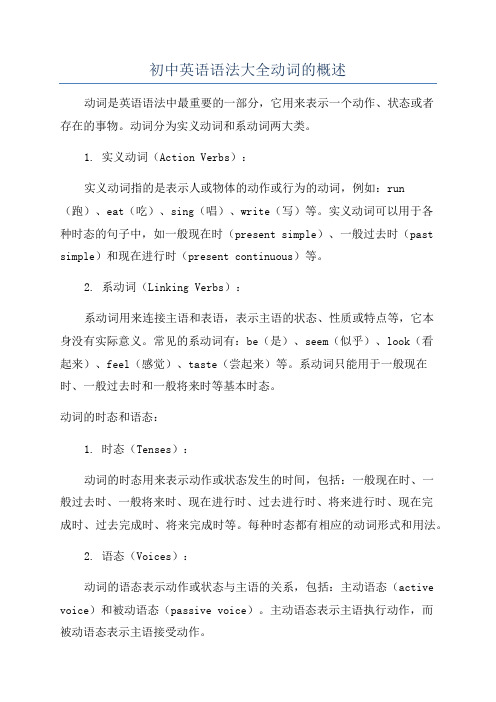
初中英语语法大全动词的概述动词是英语语法中最重要的一部分,它用来表示一个动作、状态或者存在的事物。
动词分为实义动词和系动词两大类。
1. 实义动词(Action Verbs):实义动词指的是表示人或物体的动作或行为的动词,例如:run (跑)、eat(吃)、sing(唱)、write(写)等。
实义动词可以用于各种时态的句子中,如一般现在时(present simple)、一般过去时(past simple)和现在进行时(present continuous)等。
2. 系动词(Linking Verbs):系动词用来连接主语和表语,表示主语的状态、性质或特点等,它本身没有实际意义。
常见的系动词有:be(是)、seem(似乎)、look(看起来)、feel(感觉)、taste(尝起来)等。
系动词只能用于一般现在时、一般过去时和一般将来时等基本时态。
动词的时态和语态:1. 时态(Tenses):动词的时态用来表示动作或状态发生的时间,包括:一般现在时、一般过去时、一般将来时、现在进行时、过去进行时、将来进行时、现在完成时、过去完成时、将来完成时等。
每种时态都有相应的动词形式和用法。
2. 语态(Voices):动词的语态表示动作或状态与主语的关系,包括:主动语态(active voice)和被动语态(passive voice)。
主动语态表示主语执行动作,而被动语态表示主语接受动作。
动词的形式变化:1.时态、人称和数的变化:动词的形式会根据时态、人称和数的不同而发生变化。
一般而言,动词在第三人称单数形式(he/she/it)中,要在词尾加上-s或-es,如:eat(吃)→ eats(吃),go(去)→ goes(去)。
2.动词的过去式和过去分词形式:大部分动词的过去式是在词尾加-ed,如:work(工作)→ worked (工作过)。
而过去分词的形式分为规则动词和不规则动词。
规则动词在词尾加-ed,如:played(玩过),而不规则动词则没有规则可循,如:gone(去过)。
语法动词知识点
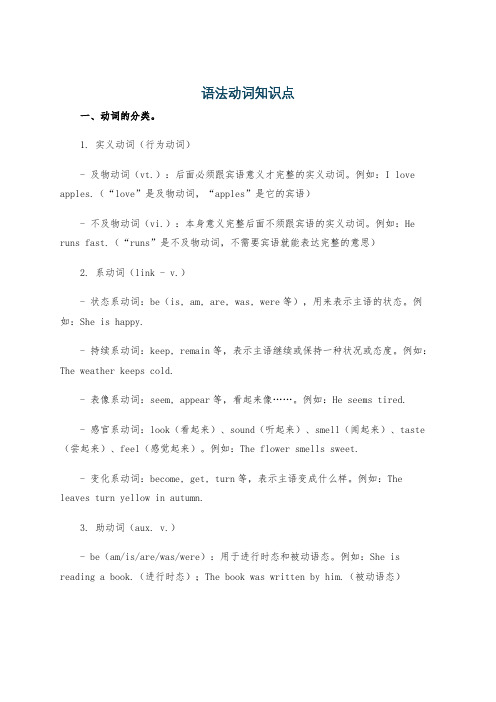
语法动词知识点一、动词的分类。
1. 实义动词(行为动词)- 及物动词(vt.):后面必须跟宾语意义才完整的实义动词。
例如:I love apples.(“love”是及物动词,“apples”是它的宾语)- 不及物动词(vi.):本身意义完整后面不须跟宾语的实义动词。
例如:He runs fast.(“runs”是不及物动词,不需要宾语就能表达完整的意思)2. 系动词(link - v.)- 状态系动词:be(is, am, are, was, were等),用来表示主语的状态。
例如:She is happy.- 持续系动词:keep, remain等,表示主语继续或保持一种状况或态度。
例如:The weather keeps cold.- 表像系动词:seem, appear等,看起来像……。
例如:He seems tired.- 感官系动词:look(看起来)、sound(听起来)、smell(闻起来)、taste (尝起来)、feel(感觉起来)。
例如:The flower smells sweet.- 变化系动词:become, get, turn等,表示主语变成什么样。
例如:The leaves turn yellow in autumn.3. 助动词(aux. v.)- be(am/is/are/was/were):用于进行时态和被动语态。
例如:She is reading a book.(进行时态);The book was written by him.(被动语态)- do/does/did:用于构成疑问句和否定句,以及强调句等。
例如:Do you like music?(疑问句);He doesn't go to school on Sunday.(否定句);I do love you.(强调句)- have/has/had:用于完成时态。
例如:I have finished my homework.4. 情态动词(modal v.)- can/could:表示能力(过去式为could)、许可(在口语中常用)等。
高考英语大纲规定的24个语法梳理(五)

高考英语大纲规定的24个语法梳理(五)★ 动词不定式1不定式的构成及变形动词不定式是由不定式符号to+动词原形构成,在某些情况下to 也可省略。
⒈ 不定式的一般式不定式的一般式表示的动作通常与谓语的动作同时或几乎同时发生,或是在它之后发生。
如:He appears to be very happy.(同时发生)To catch the train, we'd better hurry to the station by taxi.(to catch the train发生在hurry to the station之后)⒉ 不定式的进行式不定式的进行式表示正在进行的或与谓语动词同时发生的动作。
如:It happened to be raining when I got there.⒊ 不定式的完成式不定式的完成式表示的动作在谓语表示的动作之前发生。
如:I'm sorry to have lost your key.⒋ 不定式的完成进行式不定式的完成进行式表示的动作在谓语之前发生并且一直进行着。
如:He was said to have been living in London for twenty years.不定式的时态意义:如:He is said to be studying abroad.(不定式的进行式表示动作正在进行)He is said to have studied abroad.(不定式的完成式表示动作已经结束)⒌ 不定式的被动形式当不定式逻辑上的主语是这个不定式表示的动作的承受者时,不定式一般要用被动形式。
不定式的被动形式根据其与谓语动作发生的先后关系,有一般式和完成时两种。
① 一般式 to be done如:These are the books to be given out to the students.② 完成式 to have been done如:The novel is said to have been translated into many languages.⒍ 不定式的否定形式不定式的否定形式由not或never加不定式构成。
2024年初中英语语法专题复习之动词讲义
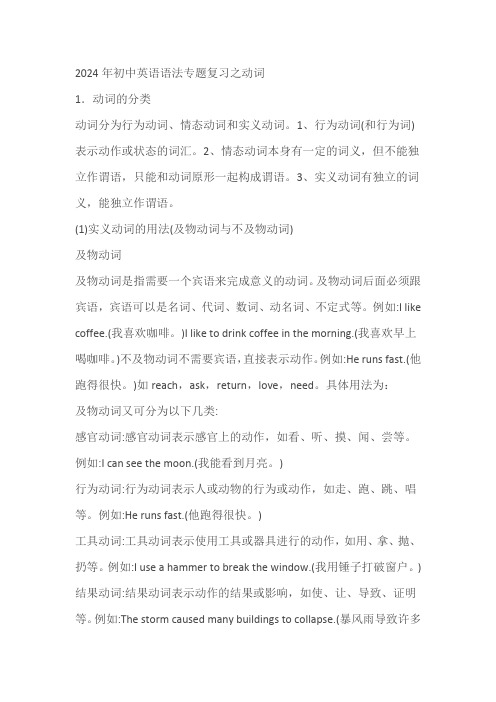
2024年初中英语语法专题复习之动词1.动词的分类动词分为行为动词、情态动词和实义动词。
1、行为动词(和行为词)表示动作或状态的词汇。
2、情态动词本身有一定的词义,但不能独立作谓语,只能和动词原形一起构成谓语。
3、实义动词有独立的词义,能独立作谓语。
(1)实义动词的用法(及物动词与不及物动词)及物动词及物动词是指需要一个宾语来完成意义的动词。
及物动词后面必须跟宾语,宾语可以是名词、代词、数词、动名词、不定式等。
例如:I like coffee.(我喜欢咖啡。
)I like to drink coffee in the morning.(我喜欢早上喝咖啡。
)不及物动词不需要宾语,直接表示动作。
例如:He runs fast.(他跑得很快。
)如reach,ask,return,love,need。
具体用法为:及物动词又可分为以下几类:感官动词:感官动词表示感官上的动作,如看、听、摸、闻、尝等。
例如:I can see the moon.(我能看到月亮。
)行为动词:行为动词表示人或动物的行为或动作,如走、跑、跳、唱等。
例如:He runs fast.(他跑得很快。
)工具动词:工具动词表示使用工具或器具进行的动作,如用、拿、抛、扔等。
例如:I use a hammer to break the window.(我用锤子打破窗户。
) 结果动词:结果动词表示动作的结果或影响,如使、让、导致、证明等。
例如:The storm caused many buildings to collapse.(暴风雨导致许多建筑倒塌。
)状态动词:状态动词表示状态或性质,如是、成为、有、保持等。
例如:She is a doctor.(她是一名医生。
)不及物动词不及物动词不需要宾语,直接表示动作。
例如:He walks quickly.(他走得很快。
)不及物动词又可分为以下几类:感官动词:感官动词表示感官上的动作,如看、听、摸、闻、尝等。
英语动词的语法归纳

英语动词的语法归纳在学习英语语法时,动词的语法可以说是重中之重。
那么你知道英语动词有哪些语法知识吗?下面由店铺为大家整理的英语动词的语法归纳,希望大家喜欢!英语动词的语法归纳动词1)表示动作中状态的词叫做动词。
2)根据其在句中的功能,动词可分为四类,分别是:实义动词(Notional Verb)、系动词(Link Verb)、助动词(Auxiliary Verb)、情态动词(Modal Verb)。
说明:有些情况下,有些动词是兼类词,例如:We are having a meeting. 我们正在开会。
(having是实义动词。
)He has gone to New York. 他已去纽约。
(has是助动词。
)3)动词根据其后是否带有宾语,可分为两类,分别是:及物动词(Transitive Verb)、不及物动词(Intransitive Verb),缩写形式分别为vt.和vi.。
说明:同一动词有时可用作及物动词,有时可用作不及物动词。
例如:She can dance and sing. 她能唱歌又能跳舞。
(sing在此用作不及物动词。
)She can sing many English songs. 她能唱好多首英文歌曲。
(sing用作及物动词。
)4)根据是否受主语的人称和数的限制,可分两类,分别是:限定动词(Finite Verb)、非限定动词(Non-finite Verb)例如:She sings very well. 她唱得很好。
(sing受主语she的限制,故用第三人称单数形式sings。
)She wants to learn English well. 她想学好英语。
(to learn不受主语she的限制,没有词形变化,是非限定动词。
说明:英语中共有三种非限定动词,分别是:动词不定式(Infinitive)、动名词(Gerund)、分词(Participle)。
5)根据动词的组成形式,可分为三类,分别是:单字词(One-Word Verb)、短语动词(Phrasal Verb)、动词短语(Verbal Phrase)例如:The English language contains many phrasal verbs and verbal phrases. 英语里有许多短语动词和动词短语。
动词语法简介
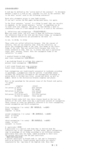
number and gender with the noun it modifies. In the example,
the participle is made to agree with the plural noun (les animaux)
auxiliary verb to form the past tense of perdre (to lose).
In the second example, the participle is used as an adjective
to modify the noun 'la lettre'. Note how the final -e on
vendre to sell
entendre to listen
2. participle(分词)
A participle is a special verb form that is derived from the
infinitive but is not conjugated. In other words, while conjugations
forms of the verb. They are called finite because they refer to
events anchored in time, that is, to events that have a particular
tense: past, present, future. Note the conjugated forms of the
2021高考英语大纲规定的24个语法梳理
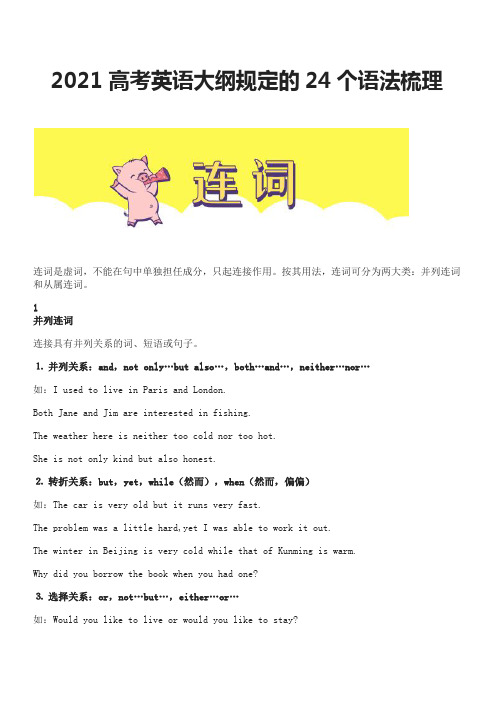
2021高考英语大纲规定的24个语法梳理连词是虚词,不能在句中单独担任成分,只起连接作用。
按其用法,连词可分为两大类:并列连词和从属连词。
1并列连词连接具有并列关系的词、短语或句子。
⒈ 并列关系:and,not only…but also…,both…and…,neither…nor…如:I used to live in Paris and London.Both Jane and Jim are interested in fishing.The weather here is neither too cold nor too hot.She is not only kind but also honest.⒉ 转折关系:but,yet,while(然而),when(然而,偏偏)如:The car is very old but it runs very fast.The problem was a little hard,yet I was able to work it out.The winter in Beijing is very cold while that of Kunming is warm.Why did you borrow the book when you had one?⒊ 选择关系:or,not…but…,either…or…如:Would you like to live or would you like to stay?He is not a teacher but a writer.You can come either on Saturday or on Sunday.⒋ 因果关系:for如:It must have rained last night,for the ground is wet now.The leaves of the trees are falling. for already autumn.5. 区别① and和or⑴ 并列结构中,or通常用于否定句,and 用于肯定句。
新概念二册L1-L24课语法总结

L1五大基本句型1. 主+谓The sun rises .2. 主+谓+宾I love you .3. 主+系+ 表The roses are beautiful .4. 主+谓+宾+宾补English is driving me crazy .5 . 主+谓+双宾I sent you an e-mail .句子基本结构:主谓宾定状补表L2频度副词的位置:实前be后或助后感叹句的两种结构:What +a/an (+adj.)+n.(+主语+谓语)!What a good girl (she is)!How + adj. / adv. + 主语+ 谓语!How lovely the girl is !瞬间动词的进行时表将来,常见的瞬间动词有:go, come, leave,arrive,land,meet, die, start,return…L3表‘给予’意思的动词后面可以跟双宾语,常见的动词有:give , bring , teach , show , send , make , lend , owe , tell , sell , read , write , offer , pass , choose , find , leave , get , play , hand , do , buy , orderL4常常和现在完成时连用的时间状语:since + 点时间,for + 短时间,… times , so far , up to now , 现完时态中如出现since + 点时间或for + 短时间,则该句子中的动词应使用延续性动词。
如:I have borrowed this book for two weeks (x) I have kept this book for two weeks . (∨)L5关于way 的短语总结in this way 以这种方法,on the way (to) 在去…的路,in the way 挡路,out of the way 让路,no way 没门,in a way 从某种程度上说L6关于call 的短语和knock 的短语Call on sb. 拜访某人,call at sb. 拜访某地,call in 召集,call off 取消,call out 大喊,call up sb. 给某人打电话,call for 需要Knock at 敲,knock sb. over 把某人撞倒,knock sth. off somewhere , 把某物从某处碰掉,knock off the price 打折,knock off 下班,knock sb. out 把某人打昏L7When 当…时候,表示‘点时间’或‘段时间’,主句和从句的动作可同时发生,也可先后分别发生,谓语动词可以是短暂动词,也可以是延续动词。
英语语法动词的知识总结

英语语法动词知识总结一、动词定义动词是表示动作、行为、状态或存在的词。
在英语中,动词可以根据其作用和功能分为及物动词和不及物动词。
及物动词可以带宾语,而不及物动词则不能。
此外,还有一些动词既可以作为及物动词也可以作为不及物动词。
二、动词时态动词的时态是表示动作发生的时间和方式的语法形式。
英语中主要有16种时态,包括现在时、过去时、将来时等。
每种时态都有不同的形式,以表达动作正在进行、已经完成或即将发生等。
三、动词语态动词语态是表示动词和主语之间关系的语法形式。
英语中有两种语态:主动语态和被动语态。
主动语态表示主语是动作的执行者,而被动语态则表示主语是动作的承受者。
四、动词形式动词的形式是表示动词基本意义的变化形式。
英语中有许多动词形式,包括现在时形式、过去时形式、完成时形式等。
这些形式可以根据不同的语法规则进行变化,以表达不同的意义和时态。
五、动词的及物性及物动词和不及物动词是英语中两种主要的动词类型。
及物动词可以带宾语,表示动作对宾语的影响或结果。
例如,“write a letter”(写信)中的“write”就是及物动词。
不及物动词不能带宾语,表示动作本身或状态的变化。
例如,“run”(跑)和“jump”(跳)都是不及物动词。
六、动词的否定形式动词的否定形式是通过在动词前加上否定词或否定短语来表示对动作的否定。
常见的否定词有“not”、“no”、“never”等。
例如,“I do not like you”(我不喜欢你)中的“do not”就是否定形式。
七、动词的疑问句形式疑问句是把疑问词放在句子的主语或主谓之间,形成疑问语气。
在英语中,疑问句通常使用倒装语序,即将助动词放在主语之前。
例如,“Do you like me?”(你喜欢我吗?)中的“Do”就是助动词,放在主语“you”之前形成疑问句。
八、动词的强调形式强调是突出句子中的某个成分,使其更具有重要性和突出性。
在英语中,强调动词通常使用强调词“do”或“does”,放在动词之前。
高考语法24知识点
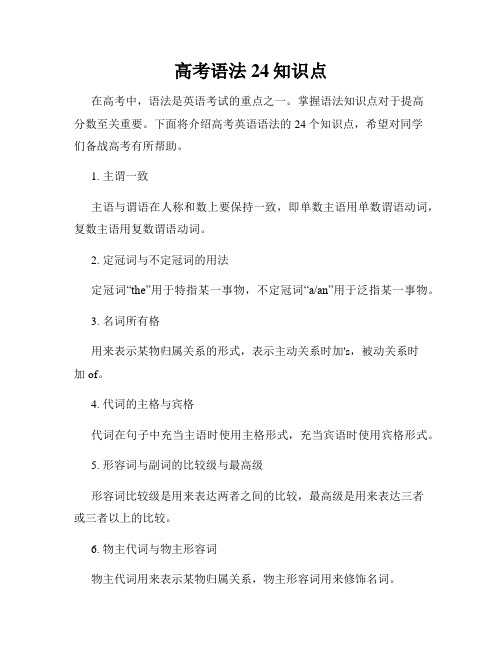
高考语法24知识点在高考中,语法是英语考试的重点之一。
掌握语法知识点对于提高分数至关重要。
下面将介绍高考英语语法的24个知识点,希望对同学们备战高考有所帮助。
1. 主谓一致主语与谓语在人称和数上要保持一致,即单数主语用单数谓语动词,复数主语用复数谓语动词。
2. 定冠词与不定冠词的用法定冠词“the”用于特指某一事物,不定冠词“a/an”用于泛指某一事物。
3. 名词所有格用来表示某物归属关系的形式,表示主动关系时加's,被动关系时加of。
4. 代词的主格与宾格代词在句子中充当主语时使用主格形式,充当宾语时使用宾格形式。
5. 形容词与副词的比较级与最高级形容词比较级是用来表达两者之间的比较,最高级是用来表达三者或三者以上的比较。
6. 物主代词与物主形容词物主代词用来表示某物归属关系,物主形容词用来修饰名词。
7. 反身代词表示动作的主体同时也是动作的受体,常用于动词后作宾语。
8. 不定代词的用法不定代词用来泛指某一事物,如somebody, anybody, nobody等。
9. 疑问代词与疑问副词用来提问的代词和副词,如who, what, when, where。
10. 数词的用法表示数目的词汇,如cardinal numbers和ordinal numbers。
11. 情态动词用来表示说话人的情绪、意愿、能力等,如can, could, may, might。
12. 动词的时态和语态动词根据动作发生的时间和状态进行时态和语态的变化。
13. 系动词与助动词系动词用来连接主语和表语,助动词用来构成各种时态和语态。
14. 直接引语与间接引语直接引语是直接引用别人的话,间接引语是陈述别人说的话。
15. 并列连词的用法用于连接并列的单词、短语和句子,如and, but, so。
16. 从属连词的用法用来引导从句的词,如if, because, when。
17. 状语从句的种类和用法状语从句是用来修饰动词、形容词或其他副词的从句。
动词语法知识点总结

动词语法知识点总结一、动词的分类动词根据其词义和用法可以分为实义动词和系动词两种。
1. 实义动词:表示实际的行为或者状态,例如"run"、"eat"、"sleep"等。
实义动词可以进一步分为及物动词和不及物动词。
及物动词:需要接受动作作用的宾语,例如"I eat an apple"中的"eat"就是及物动词,"an apple"就是宾语。
不及物动词:不需要接受动作作用的宾语,例如"He sleeps"中的"sleeps"就是不及物动词。
2. 系动词:表示状态、性质、位置等,例如"be"、"become"、"seem"等。
二、动词的时态动词的时态是指动作发生的时间,包括一般时、进行时、完成时和将来时。
1. 一般时:表示经常性或者普遍性的动作或情况,包括过去时、现在时和将来时。
过去时:表示过去发生的动作或情况,例如"I went to school"。
现在时:表示现在正在进行或者经常发生的动作或情况,例如"I am writing an article"。
将来时:表示将来将要发生的动作或情况,例如"We will go to the movie tomorrow"。
2. 进行时:表示动作正在进行的状态,用"be + V-ing"构成,例如"He is reading a book"。
3. 完成时:表示动作已经完成的状态,用"have/has + 过去分词"构成,例如"I have finished my homework"。
4. 将来时:表示将来要发生的动作,用"will/shall + 动词原形"构成,例如"They will cometo visit me next week"。
动词语法知识点

动词语法知识点
动词是英语中一个非常重要的词类,掌握动词的语法知识点对于提高英语语言表达能力至关重要。
以下是动词语法知识点:
1. 时态:动词的时态用于描述动作发生的时间。
常见的时态包括现在时、过去时、将来时和过去将来时等。
2. 语态:动词的语态包括被动语态和主动语态。
被动语态表示动作的接受者是主语,而主动语态表示动作的执行者是主语。
3. 语气:动词的语气用于表达说话人的态度或情感。
常见的语气有陈述语气、祈使语气和虚拟语气等。
4. 助动词:助动词是帮助主要动词表达完整意义的词,常见的助动词有be、do、have等。
5. 情态动词:情态动词用于表达可能性、必要性、意愿等意义,常见的情态动词有can、must、should等。
6. 非谓语动词:非谓语动词是指不作谓语的动词形式,包括动名词、不定式和分词等。
7. 短语动词:短语动词是由一个动词加上一个或多个介词或副词构成的短语,常见的短语动词有“make up”、“break down”等。
8. 虚拟语气:虚拟语气是一种特殊的语气,用于表达与实际情况相反的情况或假设的情况。
9. 强调句型:强调句型用于强调句子中的某个部分,常见的强调句型有“It is/was+被强调部分+that/who+其余部分”。
以上是动词语法知识点的一些常见内容,掌握这些知识点有助于更好地理解和运用英语中的动词。
英语语法(Unit24)
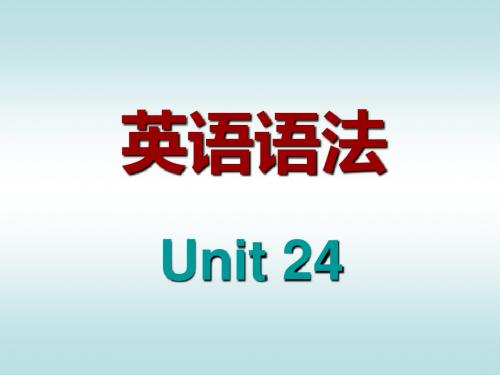
1. I asked him to speak loudly so we may hear him clearly. 2. We should save some spare money on normal days so that we could withstand the risks when there was a crisis. 3. I wrote all the news words on the walls in my bedroom in order that I might have a look at them at any time. in order连接状语时还有另一种形式:in order to。但 连接状语时还有另一种形式: 连接状语时还有另一种形式 。 它的后边不能接从句,只能接由不定式构成的短语结构。 它的后边不能接从句,只能接由不定式构成的短语结构。例: I went to bed very early in order to get up before 5 o’clock the next morning.
Activity 2 (标出引导结果状语从句的连词) 标出引导结果状语从句的连词)
The house next to the supermarket was sold last month, and has been under renovation(修整) for the (修整) past few weeks(注意前边这两个句子中的动词时态不同, (注意前边这两个句子中的动词时态不同, 并共用同一个主语) 并共用同一个主语). The new owner wanted more sunlight to reach the rooms, so the workers started tearing down(撕扯、拆除)several walls. The noise (撕扯、拆除) was so deafening(震耳欲聋)that it was impossible to (震耳欲聋) shop when work at the site is going on. The supermarket manager decided to complain, to try to rescue (挽救)his shrinking (缩减的)income. 挽救) 缩减的)
动词语法总结
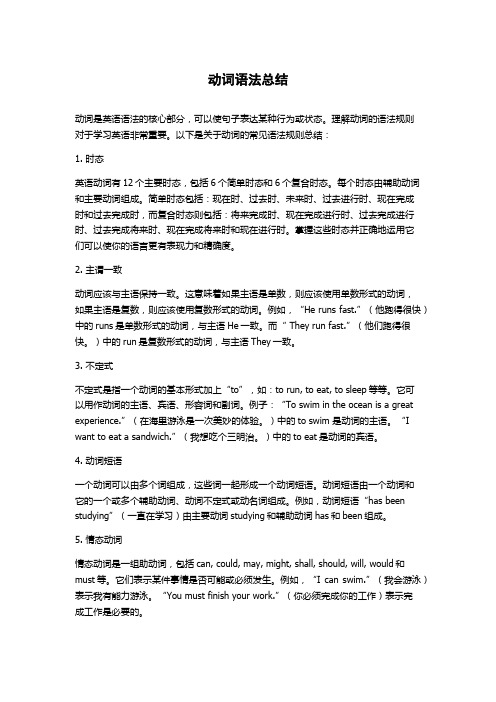
动词语法总结动词是英语语法的核心部分,可以使句子表达某种行为或状态。
理解动词的语法规则对于学习英语非常重要。
以下是关于动词的常见语法规则总结:1. 时态英语动词有12个主要时态,包括6个简单时态和6个复合时态。
每个时态由辅助动词和主要动词组成。
简单时态包括:现在时、过去时、未来时、过去进行时、现在完成时和过去完成时,而复合时态则包括:将来完成时、现在完成进行时、过去完成进行时、过去完成将来时、现在完成将来时和现在进行时。
掌握这些时态并正确地运用它们可以使你的语言更有表现力和精确度。
2. 主谓一致动词应该与主语保持一致。
这意味着如果主语是单数,则应该使用单数形式的动词,如果主语是复数,则应该使用复数形式的动词。
例如,“He runs fast.”(他跑得很快)中的runs是单数形式的动词,与主语He一致。
而“ They run fast.”(他们跑得很快。
)中的run是复数形式的动词,与主语They一致。
3. 不定式不定式是指一个动词的基本形式加上“to”,如:to run, to eat, to sleep等等。
它可以用作动词的主语、宾语、形容词和副词。
例子:“To swim in the ocean is a great experience.”(在海里游泳是一次美妙的体验。
)中的to swim 是动词的主语。
“I want to eat a sandwich.”(我想吃个三明治。
)中的to eat是动词的宾语。
4. 动词短语一个动词可以由多个词组成,这些词一起形成一个动词短语。
动词短语由一个动词和它的一个或多个辅助动词、动词不定式或动名词组成。
例如,动词短语“has been studying”(一直在学习)由主要动词studying和辅助动词has和been组成。
5. 情态动词情态动词是一组助动词,包括can, could, may, might, shall, should, will, would和must等。
动词语法总结

动词语法总结动词是语言中的重要成分,用于表示动作、状态、心理活动等。
它在句子中起着主要的谓语作用,并且能够表达时间、时态、语态、语气等信息。
在使用动词时,我们需要关注其词义、时态、语态和语气等方面的特点。
下面是对动词语法的总结。
一、动词的时态1. 现在时态:表示目前正在进行或经常性发生的动作。
a. 一般现在时:主要用于表达客观事实、习惯或现在的状态。
e.g. He goes to work by bus every day.(他每天乘公交车去上班。
)b. 现在进行时:表示现阶段正在进行的动作。
e.g. They are having dinner.(他们正在吃饭。
)c. 现在完成时:表示过去某时开始并持续至今的动作。
e.g. I have lived here for five years.(我在这儿住了五年了。
)2. 过去时态:表示过去发生的动作或存在的状态。
a. 一般过去时:表示在过去某个时间点发生的动作。
e.g. She studied hard last night.(昨晚她学习很努力。
)b. 过去进行时:表示在过去的某个时间段正在进行的动作。
e.g. They were playing football when it started to rain.(下雨时他们正在踢足球。
)c. 过去完成时:表示过去某个时间点之前已经完成的动作。
e.g. By the time they arrived, I had already left.(他们到达的时候,我已经离开了。
)3. 将来时态:表示将来某个时间会发生的动作或存在的状态。
a. 一般将来时:表示将来某个时间点会发生的动作。
e.g. They will go on a trip next week.(下周他们将去旅行。
) b. 将来进行时:表示将来某个时间段正在进行的动作。
e.g. We will be having a meeting at this time tomorrow.(明天此时我们将开会。
- 1、下载文档前请自行甄别文档内容的完整性,平台不提供额外的编辑、内容补充、找答案等附加服务。
- 2、"仅部分预览"的文档,不可在线预览部分如存在完整性等问题,可反馈申请退款(可完整预览的文档不适用该条件!)。
- 3、如文档侵犯您的权益,请联系客服反馈,我们会尽快为您处理(人工客服工作时间:9:00-18:30)。
法语动词语法简介A verb may be defined as the 'action word of the sentence'. To determine whether a word is a verb or not, consider its role in the sentence. How is the word 'access' used in the following sentences?Never give strangers access to your bank account.If you can't access the Web pages during peak hours, try again.In the first sentence, 'access' is a thing (a noun) that you can giveto somebody. In the second sentence, 'access' is something you do(a verb) with your computer. The point is that whether a word is considered a noun or a verb depends on how it is used in the sentence.1. infinitives and conjugations (不定式与变化式)When you study verbs, you will need to know the difference between the infinitive form of the verb and the finite forms, or conjugated forms. English infinitives are preceded by the word 'to'.to eat, to drink, to sleepThese verbs are called infinitives because, like the concept of infinity, they are not bound by time. From the infinitive, wederive the conjugated forms of the verb, also known as the finiteforms of the verb. They are called finite because they refer toevents anchored in time, that is, to events that have a particular tense: past, present, future. Note the conjugated forms of theinfinitive 'to study'.I studied French in high school.past tense conjugation(过去变化式)I am studying French in college this semester.present tense conjugation (现在变化式)I will study French next year overseas.future tense conjugation (将来变化式)Verb conjugations are traditionally presented in textbooks accordingto paradigms, a grammatical term for pattern. A paradigm always includes the infinitive followed by the conjugations according to person which is divided into first, second and third, as well as number, which is the distinction between singular and plural.Here is the paradigm for the present tense of the French verb parler, 'to speak'.parlersingular plural1st person je parle nous parlons(I speak) (we speak)2nd person tu parles vous parlez(you speak) (you speak)3rd person il/elle/on parle ils/elles parlent(he/she/it speaks) (they speak)Regular French verbs fall into three classes based on the last two letters of the verb. Each class has a particular pattern of conjugation. These classes of verbs are generally referred to as first conjugation, second conjugation and third conjugation.first conjugation (-er verbs)(第一组变化式,-er动词)danser to danceregarder to watchsecond conjugation (-ir verbs) (第二组变化式,-ir动词)finir to finishobéir to obeythird conjugation (-re verbs) (第三组变化式,-re动词)vendre to sellentendre to listen2. participle(分词)A participle is a special verb form that is derived from the infinitive but is not conjugated. In other words, while conjugations come in paradigms of six forms according to six different persons, participles have only two forms, named according to their uses:the present participle and the past participle.(现在分词与过去分词)A present participle in French ends in -ant and is frequentlyused as an adjective. French present participles are usually translated by the -ing form of the English verb. Note thatthe adjectival form of the present participle must agree innumber and gender with the noun it modifies. In the example,the participle is made to agree with the plural noun (les animaux) by adding -s.Les tatous sont des animaux fascinants.Armadillos are fascinating animals.A past participle in French is used to form compound tenses,such as the 'passé composé'. A past participle can also beused as an adjective in certain contexts. When used as an adjective, the participle agrees in number and gender with the noun it qualifies.Tex a perdu une lettre d'amour de Bette.Tex lost a love letter from Bette.Et Tammy a trouvé la lettre perdue!And Tammy found the lost letter!In the first example, the participle 'perdu' combines with the auxiliary verb to form the past tense of perdre (to lose).In the second example, the participle is used as an adjectiveto modify the noun 'la lettre'. Note how the final -e onthe participle indicates agreement with the feminine noun.3. common auxiliaries and modals(通用助动词与语态动词)Auxiliaries, often called 'helping verbs', are verbs that combinewith the main verb to form a verb phrase. There are two groups of auxiliary verbs: common auxiliaries and modals. The two common auxiliary verbs in French, avoir (to have) and être (to be) areused to form many tenses. A tense that has only a main verb andno auxiliary is called a simple tense. A verb tense that iscomposed of a main verb and its auxiliary is called a compound tense.Joe-Bob écoute de la musique country.Joe-Bob listens to country music.Joe-Bob a écouté de la musique country.Joe-Bob has listened to country music.In the first example, the main verb 'écouter' is in the simple present tense. In the second example, the verb is in the compound past tense, a tense which combines the auxiliary verb 'avoir' with the past participle of 'écouter'.Modals are special auxiliary verbs that express the attitude of the speaker. In short, modal verbs are 'moody verbs'. For example, modal verbs indicate subtle shades of meaning concerning such things as the likelihood of an event or the moral obligation of an event. The most frequent modal verbs in English are the following: should, could, may, might, ought to, must.Note how the following modal verbs in French and English convey an attitude of increased urgency.Tex peut quitter la France. Tex can leave France.Tex devrait quitter la France! Tex should leave France!Tex doit quitter la France!! Tex must leave France!!4. transitive vs. intransitive verbs(及物与不及物)Transitive verbs require a direct object while intransitive verbsdo not permit an object. A direct object is usually defined as theparty which directly receives the action designated by the verb.The terms 'transitive' and 'intransitive' are derived from the grammatical term transitivity which refers to the transfer of anaction from the subject (S) to the direct object (DO).Transitive Tex (S) écrit un poème (DO).Tex writes a poem.Intransitive Tex (S) sort.Tex goes out.5. French vs. English verbs(法语与英语)There is one important difference between French and English verbs that often causes trouble for beginning language learners. There isa high frequency of English verbs which combine with a particle (typically a preposition) to express idiomatic meanings. English speakers can completely change the meaning of the verb by changing the particle. Consider the extremely versatile English verb 'to get'.GET + particle meaning french equivalentto get about to move around se déplacerto get better to recover se remettreto get out to leave sortir, descendreto get up to get out of bed se leverIn order to convey the differences in meaning of the 'get + particle' constructions, note how French makes use of completely different verbs. As a consequence, when you translate such verbs from English into French, you must never translate word-for-word (i.e. translating the verb and particle separately). Since the verb and particle 'gotogether' in English, they must be translated as a unit in French.。
